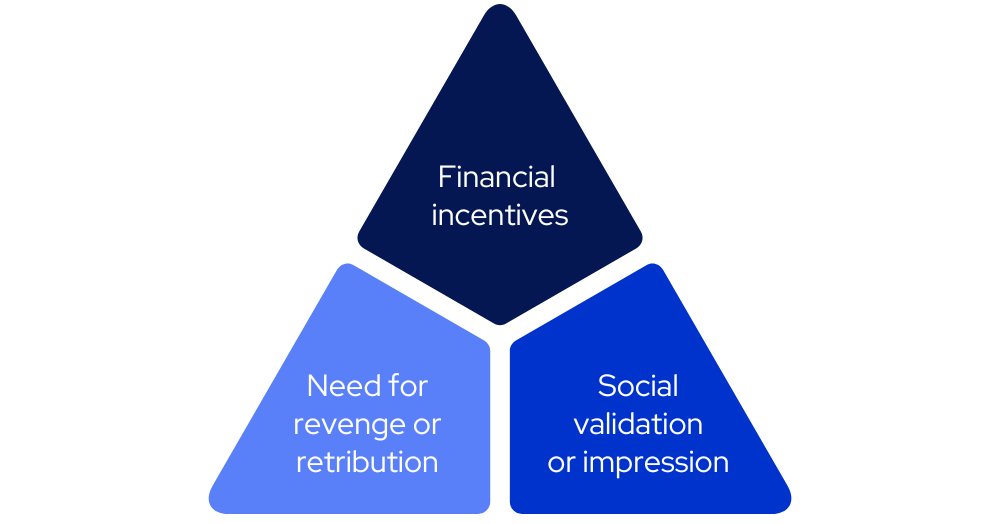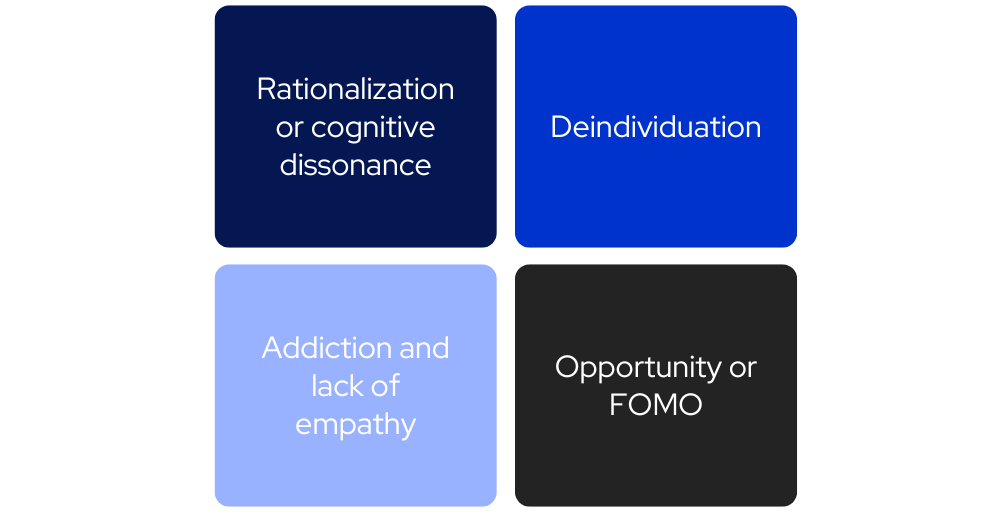Psychological factors behind committing fraud
Scamming and payment fraud represent critical issues impacting both individuals and businesses globally. It is a common misconception that individuals engaging in fraudulent activities are simply driven by greed. However, a more nuanced exploration reveals deeper psychological and motivational factors at play. What causes people to become fraudsters, and what factors contribute to this transformation? Continue reading to find out.
Motivational factors behind payment fraud

Financial incentives
Unsurprisingly, according to several studies, the majority of con artists choose this ‘career’ because the opportunity for quick money is simply too good to pass up, especially when debts are involved. Scammers can skip all the hard work and start making serious money right away.
Social validation and impressions
The desire to receive social validation is another motive for payment fraud. Some scammers believe they have special abilities and knowledge that set them apart from the rest of society. After all, who else could persuade others to divulge their most private information, right? As a result, fraudsters consider themselves special in that regard and as higher-class members of society.
Need for revenge or retribution
Some con artists choose to commit fraud to take revenge on society. This could be driven by ideology or past personal experiences. Political views and economic outlooks are examples of the driving forces that lead people to exact revenge through fraudulent activities.
Psychological factors behind payment fraud

Rationalization or cognitive dissonance
Fraudsters are notorious for rationalizing their actions. While all humans, including fraudsters, are motivated by emotions in the same way, the typical fraudster still manages to block out the guilt and regret while committing fraud. For example, they may convince themselves that what they are doing is simply borrowing money from society and that they will pay it back eventually, but that time never comes. Furthermore, they may justify their behaviour by imagining exacting revenge on society, in this way numbing all emotions.
Deindividuation
Because of the anonymous nature of the internet. Many people feel safe and untouchable online. The same is true for con artists committing online fraud. Scammers are especially motivated to continue because they believe they will never be caught as a result of this factor.
Addiction and lack of empathy
Fraud, like any other specific behaviour, develops an addictive quality over time. Consider the thrill and adrenaline that scammers feel when they attempt to defraud someone else. Such intensely stimulating feelings are undeniably addictive and grow over time. Fraudsters may eventually find it impossible to refrain from committing fraud. Furthermore, as addiction levels rise, empathy for the victims declines, which encourages this type of behaviour even more.
Opportunity or FOMO
Another significant psychological factor, influencing the lives of fraudsters, is the fear of missing out on an opportunity to make quick money. They simply do not want to miss out on ‘brilliant’ opportunities to defraud businesses and law-abiding citizens, in the same way that consumers do not want to miss out on huge sales.
The role of society in minimizing fraud
Looking at the various motivational and psychological factors behind fraud, it becomes evident that the fight against fraud is a shared responsibility. It requires the collective effort of all sectors of society, working together to create an environment where honesty and integrity are valued above short-term gains.
There is a clear need for a more robust, proactive approach, which starts from nurturing ethical consciousness and social responsibility from an early age. At the same time, businesses should protect themselves as best as they can, as eliminating low-hanging fruit would make fraud a far less lucrative endeavour.
Need help?
Payment fraud is a risky and complicated problem for many businesses. At Alphacomm, our Profit Boosters and Revenue Ambassadors have a wealth of experience and expertise in battling fraudsters. If you’re feeling uncertain about how to combat online payment fraud, we’re here to help. Don’t hesitate to get in touch with us for a quick chat or consultation session.
Let's make it happen!
Say Hello!
Address
Scheepmakerspassage 183
3011 VH Rotterdam
The Netherlands
Business
Follow us

Address
Scheepmakerspassage 183
3011 VH Rotterdam
The Netherlands
Business
Follow us

© Copyright Alphacomm B.V. | Made with <3 in Rotterdam
